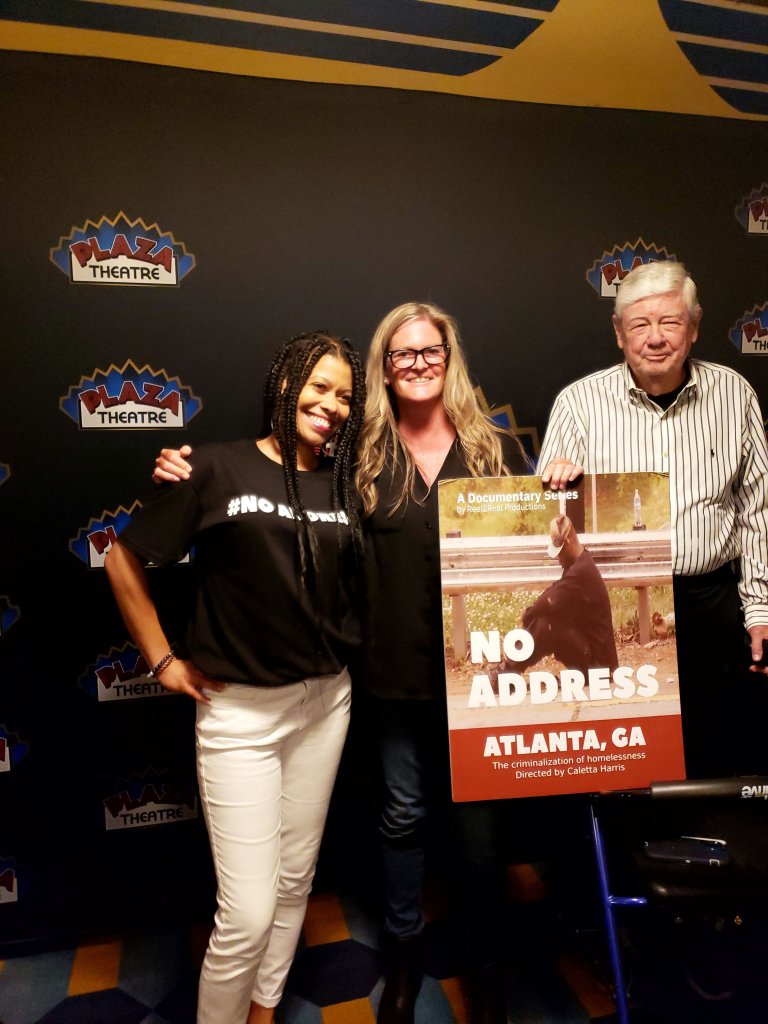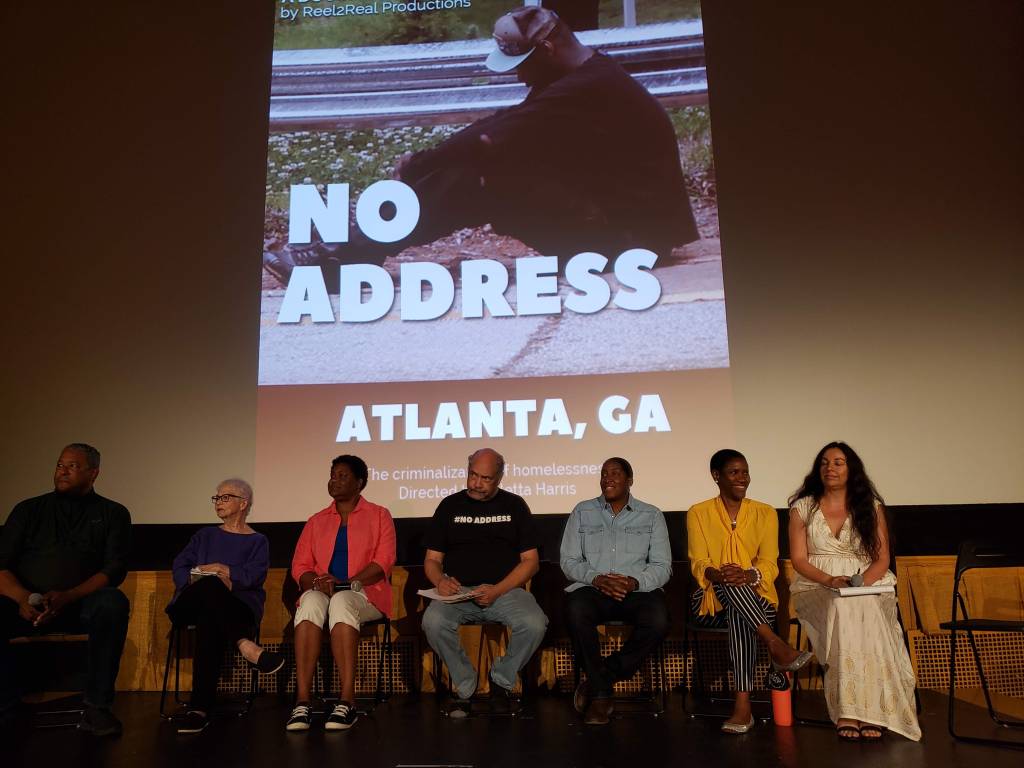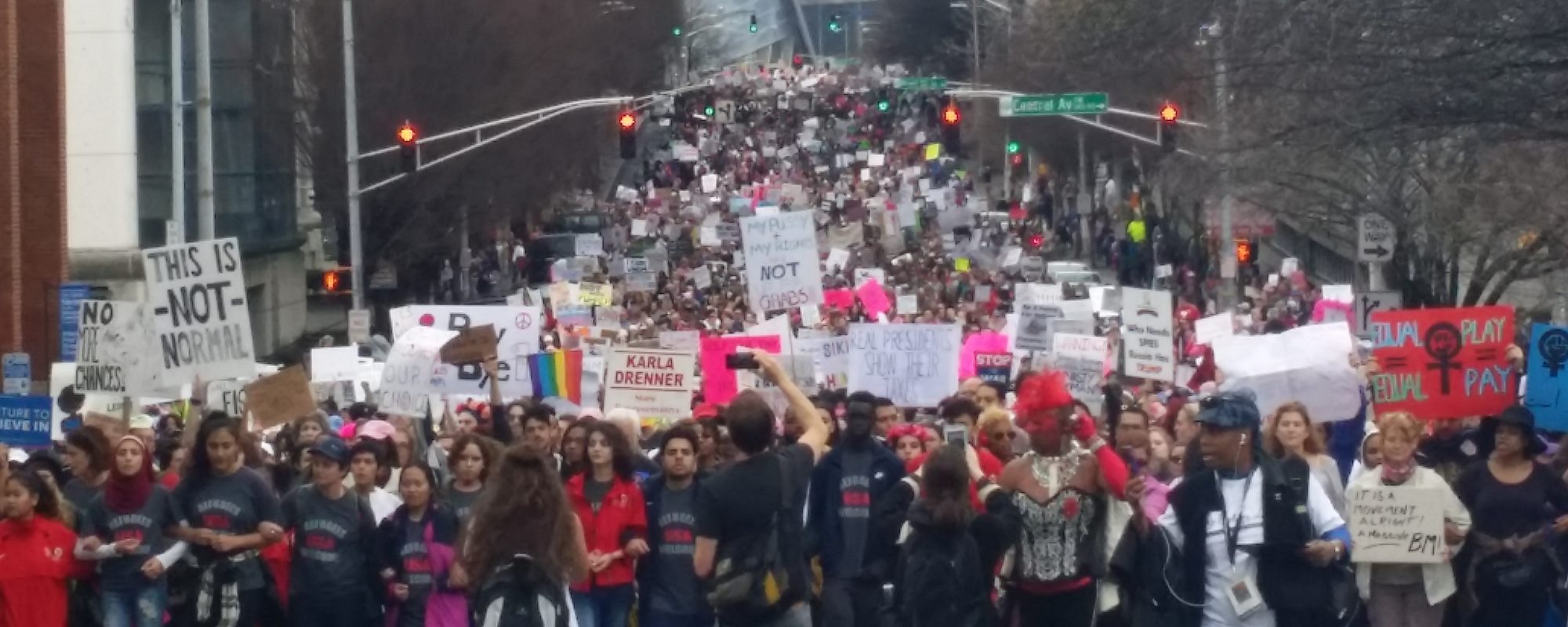
No Address is an award-winning documentary by Caletta Harris that looks at the criminalization of homelessness and solutions for change. It is a two-part documentary: Part One was filmed in Columbia, South Carolina, and Part Two in Atlanta, Georgia. Part Two, No Address Atlanta, premiered at the Plaza Theater in Atlanta on June 22.
Part Two of the documentary raises awareness of over 180 cities in America that have criminalized the homeless population, including Atlanta.
In 2016, The Atlanta City Council had 85 violations that targeted the unsheltered population. Some of those violations have been removed, but not all.
The Georgia General Assembly has bills that failed to pass last year but is waiting for the 2002-2023 session to further criminalize the unsheltered in Atlanta.
In Atlanta, the criminalization of homelessness started with the 1996 Olympics when politicians tried to hide the homeless, so visitors to the Olympics did not see them. They were arrested and jailed, while others were given a one-way bus ticket out of town. Mass arrests of homeless people happened again during the 2019 Super Bowl in Atlanta.
In 2007, elected officials once again wanted to eliminate the homeless from downtown Atlanta. After ten years of legal struggles, The Task Force For the Homeless at Peachtree and Pine, the largest homeless shelter in the Southeast, which sheltered over 900 homeless folks no one else wanted, was closed. They were given vouchers to find an apartment to rent, but few landlords wanted to rent to those who were mentally ill, addicted, and alcoholics.
As a result of the closure of Peachtree and Pine, without adequate housing for those the shelters would not accept, Atlanta was flooded with unsheltered folks sleeping on sidewalks, under bridges, in doorways, in parks, and wherever they could.
The documentary delves into gentrification, the shelter system, Covid, the moratoriums, and the solutions.
The homeless crisis has only gotten worse with gentrification and Covid.
By having everyone at the table and sharing programs that work, we can begin a more practical approach to dealing with human beings without homes.
A panel discussion after the documentary included advocates and political figures highlighted in the documentary.
PANEL DISCUSSION

ANTHONY POPE, CO-FOUNDER, AND DESIGNER OF ATELIER 7 ARCHITECTS
Pope said what resonated with him was the conditions of people living on the streets. He decided the solution was not moving people into centers but bringing housing and service to them. He started developing shipping containers and small modules that could be moved around but got shot down by NIMBY (not in my backyard).
He started working with the state to get his plans embedded in the state code so that shipping containers can be used everywhere. Now, shipping containers are classified as manufactured buildings through the HUD program.
Pope seeks to build Single Room Occupancy (SRO) to support affordable housing. The Atlanta Housing Authority approved SRO as part of the voucher program, so they are legal in Atlanta.
ANITA BEATY, DIRECTOR, TASK FORCE FOR THE HOMELESS
Beaty said the best part of her life was working at the Task Force for the Homeless at Peachtree and Pine and welcoming the unsheltered inside that building. Beaty’s Task Force was the only shelter in Atlanta with no restrictions; everyone who needed shelter was welcome.
Homeless men ran the shelter and chose whatever volunteer jobs they wanted to perform. “It proved to me that people who are down and out just need a safe place to be and an opportunity to not worry about the next meal or having a bed,” Beaty said.
The shelter had a vegetable garden with bees and a beekeeper on the roof. They also had an art gallery with original art by unsheltered people.
FELICIA MOORE, FORMER ATLANTA CITY COUNCIL PRESIDENT
“We are still seeing the results of closing Peachtree and Pine (P&P). The city needed to provide a minimum of 800 beds and spaces and wrap-around service because home housing was not enough for those evicted from P&P. I knew that would not happen, and that is why I voted against the ordinance to close P&P,” Moore said.
Because of all the violations that criminalize the unsheltered, which result in arrest, the Atlanta City Detention Center was the homeless shelter for the City of Atlanta for a long time until cash bail was eliminated. Then poor and homeless people could get out of jail, but many still had no place to go but back to the street or to shelters that would accept them.
“When Covid hit, I started listening to the providers at the Continuum of Care, and it is a disconnect from when I talk to people like Erica and Marshall who are on the ground and what they are doing. But CoC is controlling the money and the resources that the city has,” Moore said.
MARSHALL RANCIFER, FORMERLY HOMELESS, FOUNDER OF JUSTICE FOR ALL COALITION
Rancifer lived the life of a drug-addicted homeless man until the Presbyterian Church helped him get into treatment. Now he helps the homeless community.
Every day Rancifer hits the streets with food and supplies for his unsheltered friends. His supplies include tents, sleeping bags, air mattresses, hand warmers, condoms, and information. He partners with Harm Reduction Coalition with HIV testing, Hep C testing, overdose kits, and drug testing kits so people can test drugs for fentanyl. He also goes out once a week with mental health specialists and OBGYNs from Morehouse and Emory.
During Covid, he developed a flier to warn homeless folks about the pandemic, how to protect themselves from the virus, and what to do if they got it.
Rancifer talked about the DC 6 ordinance that criminalized people in a “known drug neighborhood” – that could include anyone anywhere in Atlanta. Eighteen thousand people were arrested from 2005 to 2008 from poor and Black neighborhoods. Because the cash bail system was in place, people stayed in jail for a long time and, when released, lost jobs and homes and became homeless without a support network. “They became part of the homeless generation that we still have today,” Rancifer said.
“There is a property in Southeast Atlanta that would be good for modular or tiny homes. It’s a neighborhood that has been abandoned for over 20 years, and I would love to see that property available for homeless folks,” Rancifer said.
ERICA WRIGHT, FORMERLY HOMELESS, FOUNDER OF PROJECT U FIRST
Wright has been helping the unsheltered for eight years. During Covid, Wright taught people living outside how to wash their hands with a bottle of water and gave them water to drink.
Tyler Perry donated a bus to Wright so she could take children living in extended-stay motels to school or other places they needed to go.
“Nonprofits who work on the ground have a lot of solutions, but we are not invited to the table,” Wright said.
Organizations with funding and money make all the decisions, and front-line workers on the ground are not invited to the table to help decide the solutions. “We pray that one day we will get a place at the table to bring our collective thoughts, and we can all come together to do some outstanding work,” Wright said.
TAMARA JOHNSON-SHEALEY, FORMERLY HOMELESS, ACTIVIST/POLITICIAN
I became homeless in 2014 and lived in an extended stay motel with my children. I grew up in this situation, and My father is homeless to this day in South Georgia.
I ran for office and was on your ballot in 2020 and 2022. I have been fighting for reparations to ensure we have the resources for these communities to have housing.
Johnson-Shealey ran in the Special General Election for U.S. Senate from Georgia in 2020. Ran in the Democratic primary for U.S Senate Georgia in May 2022 against Raphael Warnock.
ROBBY CABAN, REAL ESTATE BROKER
Caban wanted to help people realize the American Dream of home ownership.
But she learned that the industry had become a bastardized and commoditized version celebrating people who owned 50 or 100 rental units.
“It was the City of Atlanta that invited the West Coast here with tax credits who brought up Oakland City and put out the people who lived there with no jobs and did not protect legacy residents,” Caban said.
“I emailed Mayor Keisha Lance Bottoms for years begging her to look at these predatory practices in real estate that are solvable,” Caban said.
You can rent the documentary “No Address” and watch the official trailer below
Written and photos by Gloria Tatum

 "
"